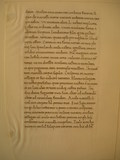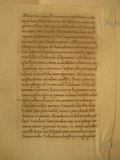Cleveland Institute of Art Leaf 39
This leaf comes from a rare manuscript of Livy's History of Rome (completed in about 9 A.D.) copied in Italy in the middle of the fifteenth century. It measures 22.5 x 16 cm and its vellum is very well prepared, though some rubbing of the ink has cast a shadow over the text block of some pages. The Humanistic script is crisp, clear, and without adornment; an exception is the Denison leaf, with its striking initial "H." See Denison University Leaf 39 for more information about this manuscript.
Text: This leaf contains the text of Livy's History, Book 27, Chapters 27-28. The English translation is that of Cyrus Edmonds (1850), via Project Gutenberg.
Reconstruction Note! In Ege's original manuscript, this leaf was followed by what is now Leaf 39 in the Cincinnati Public Library portfolio.
 Cleveland Institute of Art Leaf 39 Recto
Cleveland Institute of Art Leaf 39 Recto
Cleveland Institute of Art Leaf 39 Recto
 Cleveland Institute of Art Leaf 39 Recto Transcription
Cleveland Institute of Art Leaf 39 Recto Transcription
-derat. Multos circa unam rem ambitus fecerim si quae de Marcelli morte uariant auctores, omnia exsequi uelim. ut omittam alios, Coelius triplicem gestae rei ordinem edit, unam traditam fama, alteram scriptam in laudatione filii, qui rei gestae interfuerit, tertiam quam ipse pro inquisita ac sibi comperta affert. ceterum ita fama uariat ut tamen plerique loci speculandi causa castris egressum, omnes insidiis circumuentum tradant. [28] Hannibal magnum terrorem hostibus morte consulis unius, uolnere alterius iniectum esse ratus, ne cui deesset occasioni castra in tumulum in quo pugnatum erat extemplo transfert; ibi inuentum Marcelli corpus sepelit. Crispinus et morte collegae et suo uolnere territus, silentio insequentis noctis profectus, quos proximos nanctus est montes, in iis loco alto et tuto undique castra posuit. ibi duo duces sagaciter moti sunt, alter ad inferendam, alter ad cauendam fraudem. anulis Marcelli simul cum corpore Hannibal potitus erat. eius signi errore ne qui dolus necteretur a Poeno metuens Crispinus circa ciuitates proximas miserat nuntios occisum collegam esse anulisque eius hostem potitum: ne quibus litteris crederent nomine Marcelli compositis. paulo ante hic nuntius consulis Salapiam uenerat quam litterae ab Hannibale
 Cleveland Institute of Art Leaf 39 Recto Translation
Cleveland Institute of Art Leaf 39 Recto Translation
I should launch out into too many digressions for a single event, were I to relate all the various accounts which authors give respecting the death of Marcellus. To pass over others, Lucius Caelius gives three narratives ranged under different heads; one as it is handed down by tradition; a second, written in the panegyric of his son, who was engaged in the affair; a third, which he himself vouched for, being the result of his own investigation. The accounts, however, though varying in other points, agree for the most part in the fact, that he went out of the camp for the purpose of viewing the ground; and all state that he was cut off by an ambuscade. [28.] Hannibal, concluding that the enemy were greatly dismayed by one of their consuls being slain and the other wounded, that he might not be wanting on any opportunity presenting itself, immediately transferred his camp to the eminence on which the battle had been fought. Here he found the body of Marcellus, and interred it. Crispinus, disheartened by the death of his colleague and his own wound, set out during the silence of the following night, and encamped upon the nearest mountains he could reach, in a position elevated and secured on all sides. Here the two generals exerted their sagacity, the one in effecting, the other in guarding against, a deception. Hannibal got possession of the ring of Marcellus, together with his body. Crispinus, fearing lest any artifice should be practised by the Carthaginian's employing this signet as the means of deception, had sent round messengers to the neighbouring states, informing them, that "his colleague had been slain, and that the enemy were in possession of his seal, and that they must not give credit to any letters written in the name of Marcellus." This message of the consul arrived at Salapia a little before a letter was brought from Hannibal,
 Cleveland Institute of Art Leaf 39 Verso
Cleveland Institute of Art Leaf 39 Verso
Cleveland Institute of Art Leaf 39 Verso
 Cleveland Institute of Art Leaf 39 Verso Transcription
Cleveland Institute of Art Leaf 39 Verso Transcription
allatae sunt Marcelli nomine compositae se nocte quae diem illum secutura esset Salapiam uenturum: parati milites essent qui in praesidio erant, si quo opera eorum opus esset. sensere Salapitani fraudem; et ab ira non defectionis modo sed etiam equitum interfectorum rati occasionem supplicii peti, remisso retro nuntio—perfuga autem Romanus erat—ut sine arbitro milites quae uellent agerent, oppidanos per muros urbisque opportuna loca in stationibus disponunt; custodias uigiliasque in eam noctem intentius instruunt; circa portam qua uenturum hostem rebantur quod roboris in praesidio erat opponunt. Hannibal quarta uigilia ferme ad urbem accessit. primi agminis erant perfugae Romanorum et arma Romana habebant. ii ubi ad portam est uentum Latine omnes loquentes excitant uigiles aperirique portam iubent: consulem adesse. uigiles uelut ad uocem eorum excitati tumultuari trepidare moliri portam. cataracta clausa erat; eam partim uectibus leuant, partim funibus subducunt, in tantum altitudinis ut subire recti possent. uixdum satis patebat iter cum perfugae certatim ruunt per portam; et cum sescenti ferme intrassent, remisso fune quo suspensa erat cataracta magno sonitu cecidit. Salapitani alii perfugas negligenter
 Cleveland Institute of Art Leaf 39 Verso Translation
Cleveland Institute of Art Leaf 39 Verso Translation
...written in the name of Marcellus, to the effect, that "he should come to Salapia on the night which followed that day; that the soldiers in the garrison should hold themselves in readiness, in case he might want to employ them on any service." The Salapians were aware of the fraud, and concluding that an opportunity for punishing them was sought by Hannibal, from resentment, not only on account of their defection, but also because they slew his horsemen, sent his messenger, who was a deserter from the Romans, back again, in order that the soldiers might do what was thought necessary, without his being privy to it, and then placed the townsmen in parties to keep guard along the walls, and in convenient parts of the city. The guards and watches they formed with extraordinary care for that night, and on each side of the gate at which they supposed the enemy would come, they opposed to them the choicest of the troops in the garrison. About the fourth watch, Hannibal approached the city. His vanguard was composed of Roman deserters, with Roman arms. These, all of whom spoke the Latin language, when they reached the gate, called up the guards, and ordered the gate to be opened, for the consul had arrived. The guards, as if awakened at their call, began to be in a hurry and bustle, and exert themselves in opening the gate, which was closed by letting down the portcullis; some raised this with levers, others drew it up with ropes to such a height that the men could come in without stooping. The opening was scarcely wide enough, when the deserters eagerly rushed through the gate, and after about six hundred had got in, the rope being let go by which it was suspended, the portcullis fell with a loud noise. Some of the Salapians fell upon the deserters, who were carrying their arms carelessly...